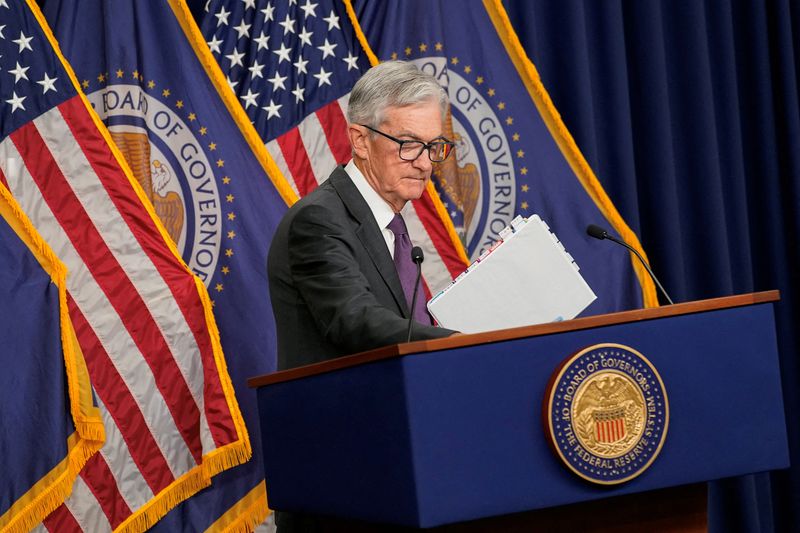
(Reuters) -The rout on Wall Street continued on Friday, with the Nasdaq earning a bear-market classification, after China imposed fresh tariffs on all U.S. goods in response to the Trump administration’s sweeping levies, escalating a global trade war.
The S&P 500, Dow and Nasdaq [.N] closed down more than 5% each. Losses accelerate after Federal Reserve chair Jerome Powell said President Donald Trump’s new tariffs are “larger than expected” and the economic fallout including higher inflation and slower growth likely will be as well, pointing to potentially difficult decisions eventually for the central bank.
The global stocks selloff sent money flooding into low-risk assets like U.S. government bonds, even as safe-haven gold recoiled from Thursday’s record high alongside a further slide in crude oil brought by fears that a trade war would cause a global recession.
U.S. Treasury yields fell sharply [US/] on Friday after China’s retaliation against Trump’s tariff plan that caught markets off guard by its scope, although declines were curtailed after a solid U.S. jobs report.
QUOTES:
DAVID SEIF, CHIEF ECONOMIST FOR DEVELOPED MARKETS AT NOMURA IN NEW YORK
“The market is still digesting the great deal of uncertainty and I think it’s also digesting the fact that both Trump and Powell have made it clear that the cavalry is not coming to immediately cause things to bounce back up.”
“We’re a long way from a Trump put. Let’s leave it at that. And we’re also pretty far from a Fed put, although a Trump put would be much more powerful, of course, because Trump can actually take off the tariffs. All that the Fed can do is cut rates, which is not a panacea for what’s for what’s going on.”
MIKE MAYO, BANK ANALYST, WELLS FARGO, NEW YORK
“I think this market selloff is a new chance for the banks to show how resilient they have become in terms of capital, liquidity and derisking since the financial crisis. They have already showed the resilience after the Silicon Valley Bank failure and during the pandemic. Now these tariffs are unprecedented, and it’s hard to know the complete picture, due to retaliations and a wide range of things that can happen.
We can expect banks to increase their reserves for loan losses due to the higher recession risk. Also the volume of reserves will be higher because now they need to account for potential losses during the lifetime of the loan, which is higher than the short term potential losses.
“We are also seeing a paralysis among people that make decisions until there is more clarity, so that will surely impact investment banking revenue, advisory and capital markets revenue probably will fall.
